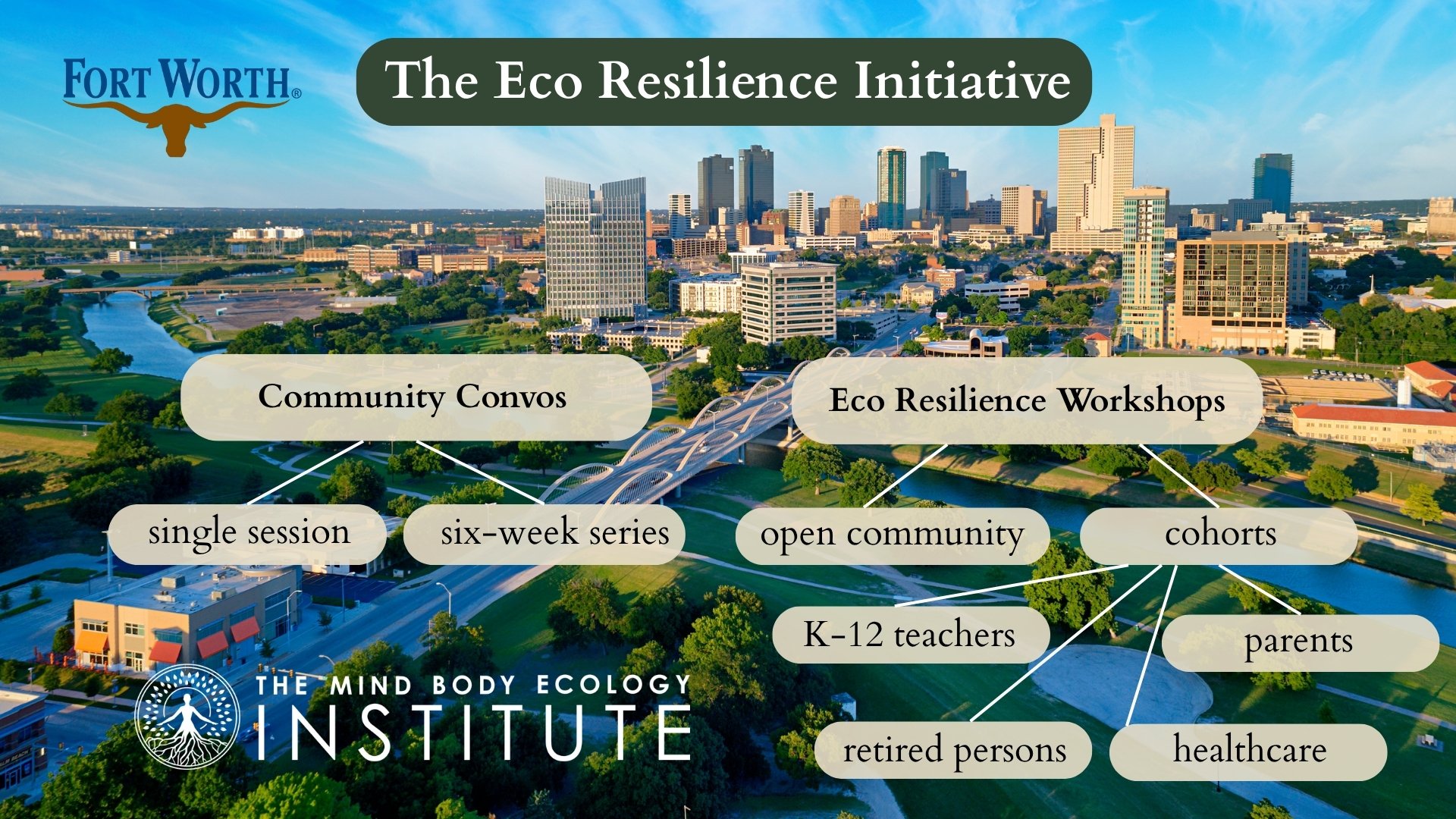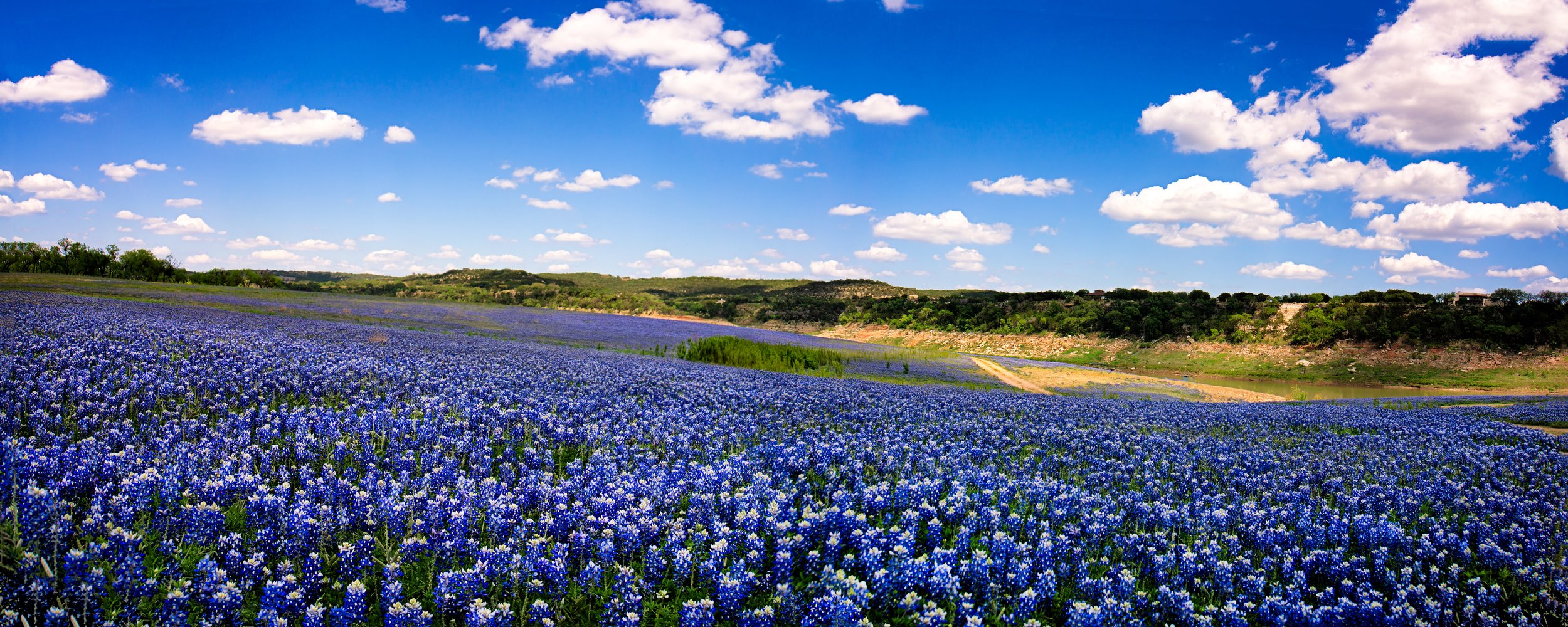
The Eco Resilience Initiative
The Mind Body Ecology Institute supports the health and wellness of individuals, communities, and the environment – right in our hometown of Fort Worth.
The Eco Resilience Initiative programs are dedicated to offering nature-based practices and educational skills that research indicates can promote personal health and emotional resilience, strengthen community ties, and encourage appreciation and care for the natural environment.
The programs also raise awareness about the importance of greenspaces in Fort Worth. Parks, trails, and natural areas do more than add beauty – they improve mental health and physical well-being, invite healthy outdoor activities, and encourage communities to take pride in living well together and with the land.
Our work aligns closely with the Texas Health Resources Community Hope program and the city’s visionary GREENprint initiative, particularly its goals to:
Place stronger emphasis on living with nature to extend the benefits of the local ecosystem citywide.
Ushering in a new era of programming that fosters engagement, connection and activation across public spaces.
Our Community Convos series offers small-group nature walks while our Eco Resilience Workshops offer hands-on educational training for members of the Fort Worth community, including cohort-specific trainings for K-12 teachers, healthcare workers, parents, and retired persons.
Our flourishing future begins within and with nature.
An eco wellness initiative for personal development and resilient living in Fort Worth, Texas.
Natural Beauty, Rich Heritage
Fort Worth is home to a cherished array of ecosystems, from urban greenspaces like the Trinity River to Lake Worth, Eagle Mountain, Benbrook Lake, and the Fort Worth Nature Center and Refuge. Fort Worth also has rich cultural traditions and heritages that can inform healthy and sustainable ways of living.
What the Research Says
Yet, there are also concerns. Our environmental challenges along with mounting mental health concerns reflect a disconnection from from self, others, and nature.
Decades of leading research indicates that developing what Richard J. Davidson at the the Center for Healthy Minds calls “the skills of well-being” in concert with nature-based learning and mindfulness practice can help.
The Drivers
The drivers of these challenges include:
Overwhelm Rapid societal change and stress.
Distraction: Compromised attention and mental health from excessive social media use, work demands, and information overload.
Disconnection: Isolation from community, the natural environment, and heritage.
Our Response
The Eco Resilience Initiative responds directly to these growing concerns, providing opportunities for growth and connection.
Our unique Eco Resilience Workshops offer training in eco education and practical nature-based wellness skills to guide people in reconnecting with nature, community, and self. In doing so, we cultivate emotional resilience and flourishing lifestyles while inspiring wise and responsible environmental stewardship.
Through Community Convos, participants explore what feels meaningful—and what may be missing—in their lives, while enhancing their sense of connection with nature as well as supporting their overall health and wellness.
Our in-house data collected anonymously from those at least three months beyond their experiences in one of our in-person programs reflects the significant impact of our work:
Fort Worth Cohort Programs
We welcome everyone 21 and up into all our Community Convos and Eco Resilience workshops!
We also offer cohort-specific Eco Resilience workshops for:
K-12 teachers
Parents
Heathcare and mental health professionals
Non-profit and public sector workers such as veterans, civic government officials and employees, police and firefighters, urban planners
Retired individuals. Elderhood provides an excellent opportunity for diving more deeply into personal exploration, learning new ideas, and sharing wisdom with others.
Overview
1. Learning the Skills and Ingredients of Resilience
Participants will explore the intersection of personal, community, and environmental health and sustainability. Our programs focus on what Richard J. Davidson, Founder and Director for the Center of Healthy Minds, calls the “skills of well-being”:
Community and Belonging
Community building
Talking circles
Storytelling
Awareness and Creativity
Nature-based mindfulness and eco meditation
Somatic movement practices
Forest bathing
Creative arts
Insight and Understanding
Exploration of cognitive and behavioral patterns
Educational discussion of topics such as self-awareness, ecosystem awareness, environmental awareness, worldviews, values, authenticity, interdependence, kinship, reverence, resilience, and flourishing
Purpose and Action
Reflection on personal skills, talents, passions, and networks with a focus on actionable steps forward in wise and responsible environmental stewardship.
Life-design techniques and impactful ways to cultivate an ecologically and socially-engaged path to support individual and planetary health.
Participants in Community Convos sessions and Eco Resilience trainings will also have the opportunity to join one of our in-person immersive programs such as The Ecology of Resilience at High Hope Ranch in Glen Rose, Texas to explore the intersection of personal, community, and environmental health.
2. Initiative Objectives
Cultivate ecological awareness through somatic practices that align with the natural rhythms and cycles of nature.
Foster a sense of belonging and community through shared experiences of evidence-based movement, meditation, and life design reflection practices.
Build emotional resilience by exploring grief, fear, and anxiety related to ecological challenges and transforming them into hope and purpose.
Empower participants with tools for integrating mindfulness and environmental stewardship into their lives and communities. Such tools include facilitate basic nature-based practices such as orienting, grounding, breath awareness, and eco mindful walking.
Take actionable steps for making a positive difference in the lives of other and the natural environment.
3. Initiative Outcomes
Participants experience improved mental health and emotional resilience.
Participants feel more connected to nature, themselves, and other people.
Participants learn and utilize new skills to better support their mental health.
Participants develop a vision and action plan for engaging with those in their own workplaces, communities, and personal lives.
A growing network of eco mindful community leaders equipped to facilitate nature-based and trauma-sensitive mindfulness practices.
Amplifying local projects and initiatives that integrate ecological knowledge and mindfulness in Fort Worth.
A renewed sense of belonging among Fort Worth communities, fostering a deep-rooted commitment to environmental stewardship.
Greater collective resilience in the face of climate-related challenges, strengthening the social fabric of the greater Fort Worth communities.
Resources
For more detail on the foundation of our work, please consider the following resources.
Calvert, Rochelle. 2021. Healing with Nature: Mindfulness and Somatic Practices to Heal from Trauma. Novato, CA: New World Library. Our work is trauma-sensitive.
Celidwen, Yuria. 2024. Flourishing Kin: How Indigenous Wisdom for Collective Well-being. Macmillan.
Chungyalpa, Dekila. 2022. “Mother Wisdom: Learning to Embody Interdependence.” Mind and Life Insights.
Davidson, Richard J. 2022. “Well-Being Is a Skill: Through Cultivating Healthy Habits of Mind, We Can Nurture Key Pillars of Well-Being.” Mind and Life Institute, Insights. Online.
Djernis, D., I. Lerstrup, D. Poulsen, U. Stigsdotter, J. Dahlsgaard, and M. O’Toole. 2019. “Systematic Review and Meta-analysis of Nature-Based Mindfulness: Effects of Moving Mindfulness Training into an Outdoor Natural Setting.” International Journal of Environmental Research and Public Health 16.
Goodman, R., A. H. Weinberger, J. H. Kim, M. Wu, and S. Galea. 2020. “Trends in Anxiety among Adults in the United States, 2008–2018: Rapid Increases among Young Adults.” Journal of Psychiatric Research 130: 441–446.
Haidt, Jonathan. 2024. The Anxious Generation: How the Great Rewiring of Childhood Is Causing an Epidemic of Mental Illness. Penguin.
Hickman, C., E. Marks, P. Pihkala, S. Clayton, R. E. Lewandowski, E. E. Mayall, B. Wray, C. Mellor, and L. van Sustern. 2021. “Climate Anxiety in Children and Young People and Their Beliefs about Governmental Responses to Climate Change: A Global Survey.” The Lancet Planetary Health 5, no. 12: 865–873.
Keltner, Dacher. 2023. Awe: The New Science of Everyday Wonder and How It Can Transform Your Life. Penguin Press.
Kral, T. R. A., P. Kesebir, L. Redford, C. J. Dahl, C. D. Wilson-Mendenhall, M. J. Hirshberg, R. J. Davidson, and R. Tatar. 2024. “Healthy Minds Index: A Brief Measure of the Core Dimensions of Well-Being.” PLoS ONE 19, no. 5.
Krawec, Patty. 2022. Becoming Kin: An Indigenous Call to Unforgetting the Past and Reimagining Our Future.
Life-Centered Design School. n.d. Life-Centered Design School. Online: https://lifecentereddesign.school.
Loy, David. 2019. Ecodharma: Buddhist Teachings for the Ecological Crisis. Wisdom Publications.
Magee, Rhonda. 2019. The Inner Work of Racial Justice: Healing Ourselves and Transforming Our Communities through Mindfulness.
Magee, Rhonda. 2022. “The End of Othering: Cultivating Just Equitable Communities.” Mind and Life Insights.
Mishra, Jyoti. 2023. “Mindfulness and the Climate Crisis.” Mind and Life Institute, Insights.
Holly Rogers, The Mindful Twenty-Something: Life Skills to Handle Stress…and Everything Else (New Harbinger)
Otto Sharmer and Katrin Kaufer, Presencing: 7 Practices for Transforming Self, Society, and Business (Berrett-Koehler Publishers).
Stanford Life Design. Life Design Lab. Online: http://lifedesignlab.stanford.edu/.
Thich Nhat Hanh. 2021. Zen and the Art of Saving the Planet. New York, NY: HarperOne.
Treleaven, David. 2018. Trauma-Sensitive Mindfulness: Practices for Safe and Transformative Healing. W. W. Norton. Our work is trauma-sensitive.
Wamsler, Christine, and Jaime Bristow. 2022. “At the Intersection of Mind and Climate Change: Integrating Inner Dimensions of Climate Change into Policymaking and Practice.” Climactic Change 173.
Wamsler, C., J. Bristow, K. Cooper, G. Steidle, S. Taggart, L. Sovold, J. Bockler, T. H. Oliver, and T. Legrand. 2022. “Theoretical Foundations Report: Research in Evidence for the Potential of Consciousness Approaches and Practices to Unlock Sustainability and Systems Transformation.” Report written for the UNDP Conscious Food Systems Alliance (CoFSA), United Nations Development Initiative (UNDP).
Wildcat, Daniel. 2009. Red Alert: Saving the Planet with Indigenous Knowledge.
Wildcat, Daniel. 2023. Indigenuity: Learning the Lessons of Mother Earth.
Wray, Britt. 2022. Generation Dread: Finding Purpose in an Age of Climate Change. Knopf Canada.



